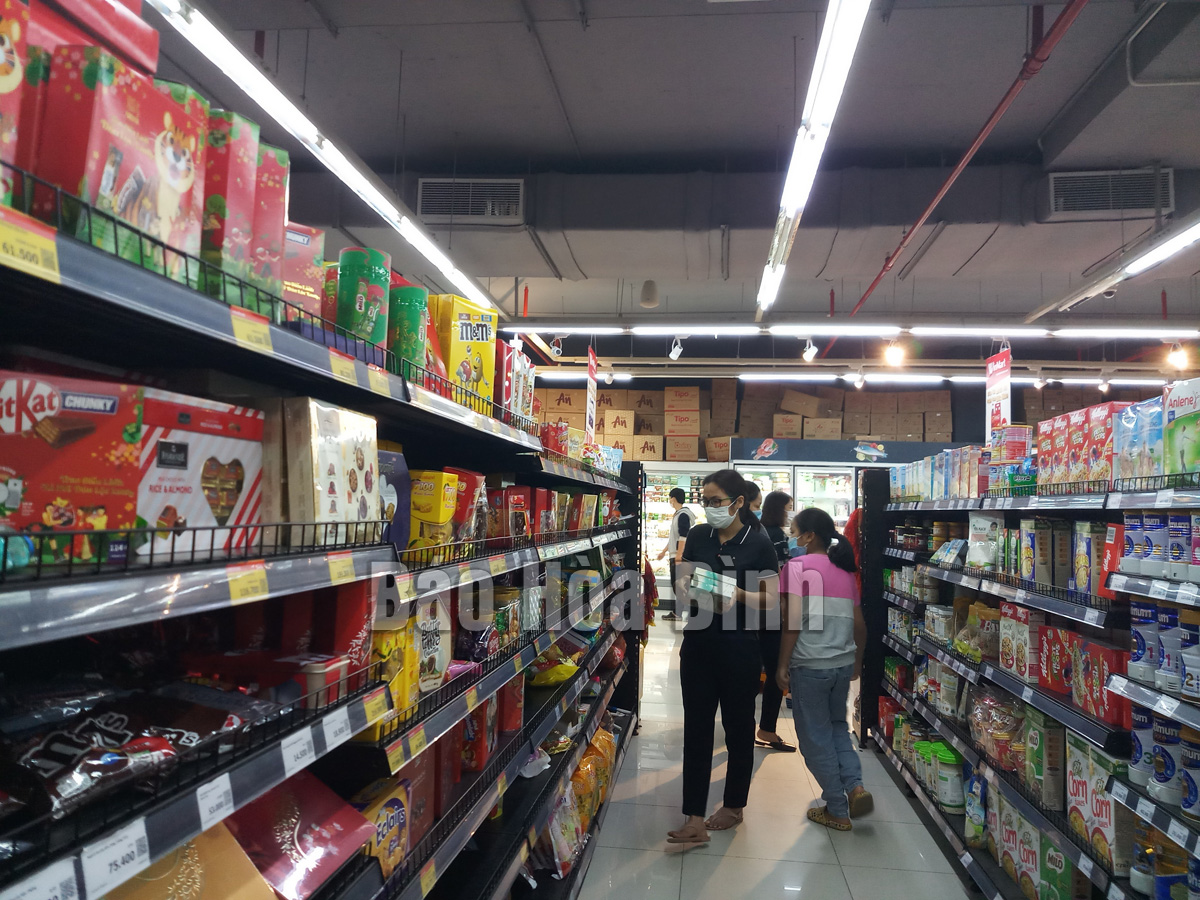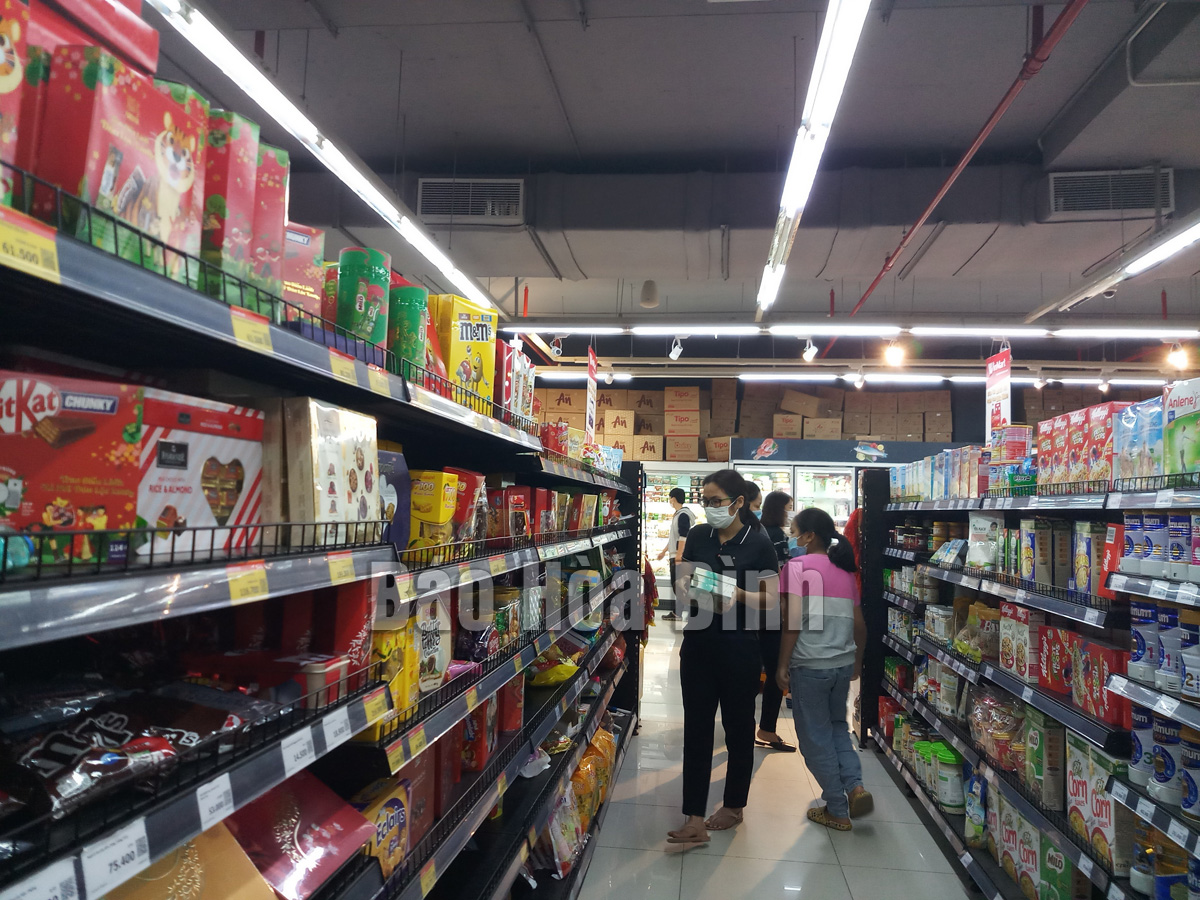
(HBO) – According to the Hoa Binh Department of Finance, relevant agencies have kept a close eye on supply-demand and market prices, and taken measures to stabilise prices of necessities serving people’s demand so as to devise timely measures and avoid unreasonable hikes. Therefore, prices in districts and Hoa Binh city remain stable, especially of foodstuff.

Some firms in Hoa Binh province
engage in a programme to stabilise prices and increase consumption (Photo taken
at Vincom Plaza mall in Hoa Binh city).
In addition to petrol price hike, prices of
some agricultural materials like seeding and insecticides marginally increased,
so did those of necessities like vegetables, meat, fish and medical supplies
for COVID-19 prevention and control.
Business activities in markets in Hoa Binh
city was not as boisterous as previous months, while fresh food and vegetables
were not as abundant as that before Tet (Lunar New Year) holiday. Prolonged
cold weather delivered a heavy blow to agricultural production, and many
traders and shop owners contracted COVID-19, affecting the supply.
Besides, thousands of COVID-19 cases were
reported daily, and families had to quarantine, resulting in a surging demand
for food and medicine.
As COVID-19 and natural disasters are
forecast to be still unpredictable, and petrol prices are on the rise, relevant
agencies have been asked to closely work together in price management and
market stabilisation.
Vice Chairman of the provincial People’s
Committee Quach Tat Liem asked for stepping up communications, minimising
impacts of price hike, and avoiding rumours that affect the market.
Relevant agencies were urged to build a
programme to stabilise the market which requests distributors, wholesalers and
retailers to maintain prices of pork, as well as join hands with the
surveillance force to increase inspections on traders’ activities to prevent
speculation.
Together with price management in all
fields, the provincial People’s Committee asked for inspections of land
regulation implementation and land prices in particular so as to sustain the
real estate market and timely handle violations, and publicise information on
land planning and roadmap, among others.
According to data from the Hoa Binh Provincial Party Committee, the industrial production index for the first six months of 2025 is estimated to have increased by 20% compared to the same period last year. This marks the highest year-on-year growth rate for this period since 2020.
In the first six months of 2025, Hoa Binh province’s export turnover was estimated at 1.145 billion USD, marking an 18.11% increase compared to the same period in 2024. Import turnover was estimated at $ 804 million, a 17.15% increase, which helped the province maintain a positive trade balance.
The lives of the ethnic minority farmers in Tan Lac district have gradually improved thanks to the new directions in agricultural production. This is a testament to the collective strength fostered through the professional associations and groups implemented by various levels of the district’s Farmers’ Union.
With the motto the "product quality comes first,” after nearly one year of establishment and operation, Muong village’s Clean Food Agricultural and Commercial Cooperative, located in Cau Hamlet, Hung Son Commune (Kim Boi district), has launched reputable, high-quality agricultural products to the market that are well-received by consumers. The products such as Muong village’s pork sausage, salt-cured chicken, and salt-cured pork hocks have gradually carved out a place in the market and they are on the path to obtaining the OCOP certification.
In the past, the phrase "bumper harvest, rock-bottom prices" was a familiar refrain for Vietnamese farmers engaged in fragmented, small-scale agriculture. But today, a new spirit is emerging across rural areas of Hoa Binh province - one of collaboration, organisation, and collective economic models that provide a stable foundation for production.
Maintaining growing area codes and packing facility codes in accordance with regulations is a mandatory requirement for agricultural products to be eligible for export. Recently, the Department of Agriculture and Environment of Hoa Binh province has intensified technical supervision of designated farming areas and packing facilities to safeguard the "green passport" that enables its products to access international markets.



